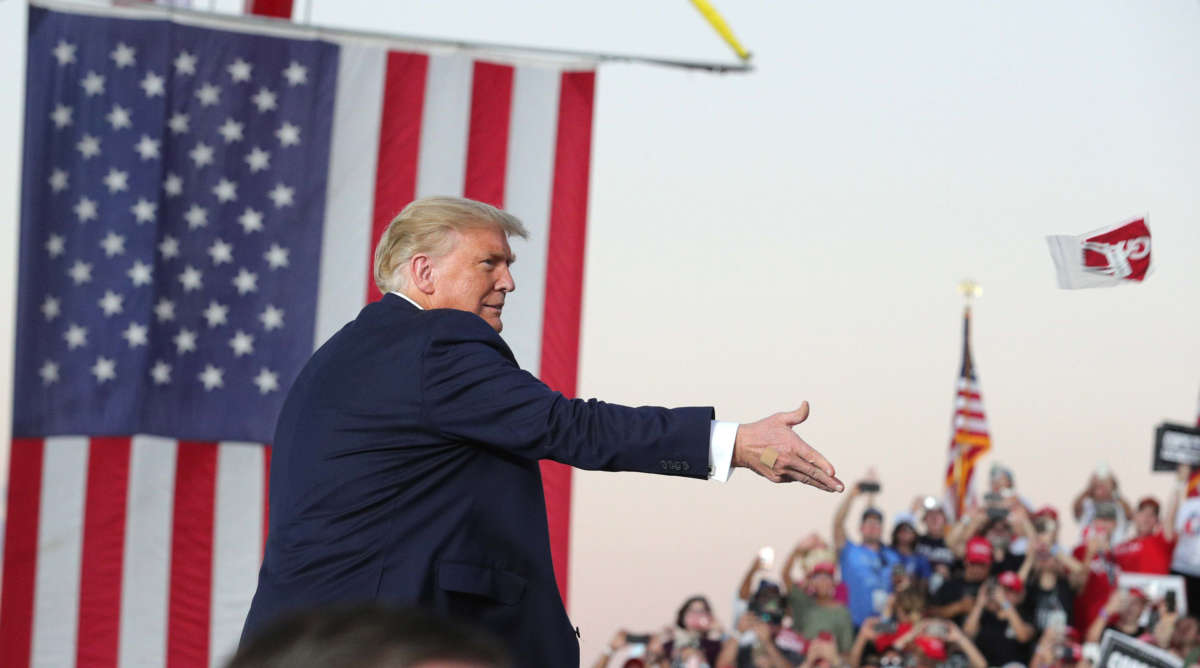During a campaign rally he held in Sanford, Florida, on Monday night, President Donald Trump told audience members that he was now immune from coronavirus, after having been treated for COVID-19 earlier this month — an assumption that health experts have warned against, especially in light of evidence that reinfection is a real possibility.
“They say I’m immune — I feel so powerful,” Trump told rally-goers.
The president also suggested that he wanted to engage in physical acts with people in the audience, saying he would “kiss everyone” at the rally — an action that, as the pandemic continues to infect tens of thousands daily in this country, would be dangerous for both him and those he interacted with.
“I’ll walk in there and kiss everyone in that audience. I’ll kiss the guys and the beautiful women. I’ll give you a big, fat kiss,” Trump said.
Trump claims he's now "immune" to the coronavirus, feeling "powerful" and willing to "kiss everyone" in the audience. "I'll kiss the guys and the beautiful women," he said. https://t.co/0brz0Rl8UQ
— The Washington Post (@washingtonpost) October 12, 2020
Trump’s declaration that he’s immune from coronavirus runs counter to what health experts say about the virus. While the suggestion from the Centers for Disease Control and Prevention (CDC) that testing a person after they recover is not necessary for at least three months unless they begin to exhibit symptoms of the disease again may imply that there might be some immunity, new evidence suggests, however, that the three-month timetable may itself may be too long to consider a person immune. According to a recent study, a 25-year-old man from Nevada contracted COVID-19 twice within a two month period, being the first confirmed case of reinfection in the U.S.
This individual first exhibited symptoms in late March, testing positive for the disease in early April. He recovered but began showing symptoms again in late May, testing positive again in early June.
The man was able to recover from the disease the second time around, but according to those who followed his progress, the second instance of infection was worse than the first.
Health experts are still unsure about how prevalent reinfection might be — it could be that a second instance of contracting coronavirus is a rare thing, or it could be occurring more often than previously thought, especially since individuals can be asymptomatic and not even realize they have COVID. An individual could, for example, contract coronavirus without knowing it, then become reinfected a month or two later and believe that they have been infected for the first time because they are experiencing symptoms this time around.
There have been at least 22 documented instances of reinfection around the world.
Trump’s comments from Monday are problematic for other reasons beyond his insistence that he is now immune to COVID. It’s not clear, for example, that he is no longer contagious.
Trump’s White House doctor, Sean Conley, wrote in a memo on Saturday that he believed that the president was no longer able to transmit the disease to others, citing CDC guidelines that say passing a 10-day period from the onset of symptoms typically means one can assume they are no longer contagious. But those same guidelines also recommend individuals with severe symptoms wait 20 days before making that assumption.
It’s unclear whether Trump falls into that latter camp or not, because his team of doctors hasn’t exactly been forthright with the public about the severity of his infection or the treatment he received. The only thing we can be sure of is that the president had access to state-of-the-art medical care that is unavailable to the rally-goers he wanted to kiss.
It’s also a possibility that Trump may still have COVID-19. In a separate note issued on Monday, Trump’s doctor announced that he had tested negative two days in a row, using a rapid form of testing called Abbott BinaxNOW. That test, however, is not considered to be highly accurate, as it has only been validated in testing individuals within the first seven days of displaying symptoms.
Conley did not state when those two days of testing occurred, but the announcement came 11 days after the president had initially announced he had contracted coronavirus.
As of Tuesday morning, more than 8 million Americans have been diagnosed with COVID-19, with 220,000 having died from the disease so far.
Press freedom is under attack
As Trump cracks down on political speech, independent media is increasingly necessary.
Truthout produces reporting you won’t see in the mainstream: journalism from the frontlines of global conflict, interviews with grassroots movement leaders, high-quality legal analysis and more.
Our work is possible thanks to reader support. Help Truthout catalyze change and social justice — make a tax-deductible monthly or one-time donation today.
